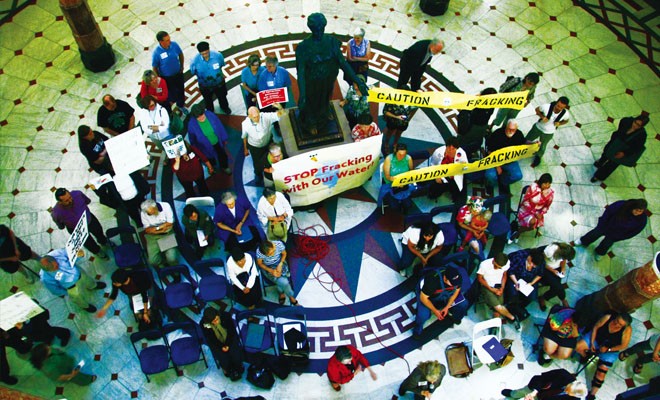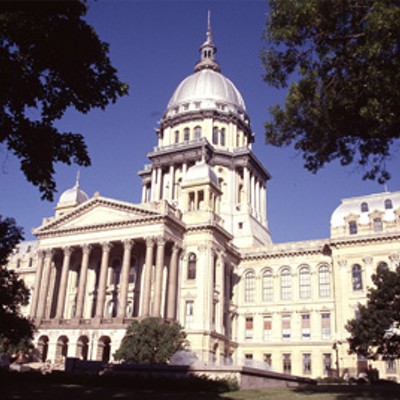Illinois is taking too long to approve regulations for a controversial oil and gas drilling method, according to a coalition of businesses. They simply asked lawmakers to speed things up with legislation to circumvent the rulemaking process.
The bill infuriated many environmental groups and ignited a flurry of calls to legislators that killed the bill last week. It was a small victory for opponents of fracking in southern Illinois, but it remains likely that regulators will approve rules those opponents find too lax.
At a May 28 press conference announcing the bill would not be acted on before the end of the spring legislative session, several members of the oil and gas industry lamented the purportedly slow rulemaking process.
“The primary goal was to protect Illinois’ air, land and water, and I think we’ve done that,” said Mark Denzler, executive director of the Illinois Manufacturer’s Association.. He said fracking could create more than 50,000 new, high-paying jobs and that fracking is “a safe and proven technology” which has been in use for 12 years nationwide.
“We think this is a win-win for Illinois,” Denzler said. “We can protect the air, water and land while creating a golden economic development throughout the state.”
Environmental groups and many scientists outside the oil and gas industry say fracking has not been studied enough to be deemed safe, and they point to a series of “fraccidents” – accidents, spills, blowouts and even earthquakes linked to fracking – in other states.
The bill to speed up fracking would have removed the authority of the Illinois Department of Natural Resources to set regulations. It would have allowed fracking in most of the state, except in Cook County and many of the surrounding counties that make up the Chicago metropolitan area.
High-volume horizontal hydraulic fracturing involves injecting millions of gallons of water, sand and potentially toxic chemicals deep underground to crack shale rock formations and release trapped deposits of oil and natural gas. The controversial extraction method is driving a boom in natural gas production in other states, but environmental activists say it has potential to pollute land, water and air. The state stands to make millions – if not billions – of dollars in revenue from fracking at a time when the state’s fiscal crisis is set to worsen because of the expiration of the temporary income tax increase.
Illinois lawmakers first approved legislation to allow fracking in June 2013. Although fracking was not banned before, the lack of a law explicitly making fracking legal apparently kept oil and gas companies from doing it. The legislation divided environmental groups, some of which saw it as their only chance to get regulations in place. Environmental groups based in the targeted areas of southern Illinois, however, saw it as Chicago-based environmental groups selling out their rights without consulting them.
Although most of the Illinois land eyed for fracking is in the southern part of the state, the targeted New Albany Shale formation includes Sangamon County and extends to Peoria. The office of the Sangamon County Recorder says no land leases for fracking have been filed here so far.
Denzler says opposition to fracking came from “the extreme in the environmental community” who want to “renegotiate the law.”
The proposed fracking regulations generated more than 30,000 public comments, most of which were opposed to fracking, and Illinois law requires the Illinois Department of Natural Resources to respond to each comment before finalizing the rules. Denzler brushes the comments aside, saying many people commented more than once and used the same form letters.
Will Reynolds, an environmental activist and Springfield native who is moving to southern Illinois to fight fracking, calls Denzler’s assertion “speculative hearsay by an industry that’s frightened by public opposition to fracking.”
“Organizations that asked the public to submit online comments allowed people to write their own unique message, as myself and many others did,” Reynolds said. “It’s offensive and anti-democratic for industry lobbyists to suggest we should ignore the public simply because some people aren’t original writers.”
Denzler called Illinois’ proposed regulations the “strongest environmental regulations in the country.”
Reynolds is not impressed.
“Claiming to have the toughest fracking law is like being the fastest turtle,” he said. “It doesn’t mean much given the competition. No one has shown that regulation can make fracking safe.”
Denzler said during the press conference that the rulemaking process was unnecessary because the legislation already contained enough regulations.
“We wrote the rules in to the law originally,” Denzler said. “Now to come out a year later and say we’re not done with the rules process is disingenuous.”
Reynolds responds that the fracking law doesn’t cover several issues like “forced pooling,” which can force landowners to lease their land for fracking if enough of their neighbors have done so.
“The fracking law was rushed through the legislature a year ago with very little public debate,” Reynolds said. “Now that we’ve had time to examine the law, it clearly doesn’t address major threats posed by fracking. It was based on political negotiations, not scientific realities.”
Despite the vehement opposition to fracking among environmental groups in southern Illinois, it’s unlikely that lawmakers will reverse their earlier decision to allow it, especially in light of the potential revenue. Reynolds says even if calling and visiting lawmakers doesn’t stop fracking, some environmentalists are willing to put their own bodies in the way through civil disobedience.
“The oil and gas industry can buy and bully compliance by state politicians,” Reynolds said, “but they will continue to face fierce opposition if they attempt to frack Illinois.”
Contact Patrick Yeagle at [email protected].
Fracking fast track bill defeated
Legislation would have sidestepped rulemaking process
[
{
"name": "Air - MedRect Combo - Inline Content 1",
"component": "11490391",
"insertPoint": "3",
"requiredCountToDisplay": "1",
"parentWrapperClass": "fdn-ads-inline-content-block"
},{
"name": "Air - MedRect Combo - Inline Content 2",
"component": "11490392",
"insertPoint": "7",
"requiredCountToDisplay": "5",
"parentWrapperClass": "fdn-ads-inline-content-block"
},{
"name": "Air - MedRect Combo - Inline Content 3",
"component": "11490393",
"insertPoint": "12",
"requiredCountToDisplay": "9",
"parentWrapperClass": "fdn-ads-inline-content-block"
}
]
Illinois Times has provided readers with independent journalism for almost 50 years, from news and politics to arts and culture.
Your support will help cover the costs of editorial content published each week. Without local news organizations, we would be less informed about the issues that affect our community..
Got something to say?
Send a letter to the editor and we'll publish your feedback in print!



















